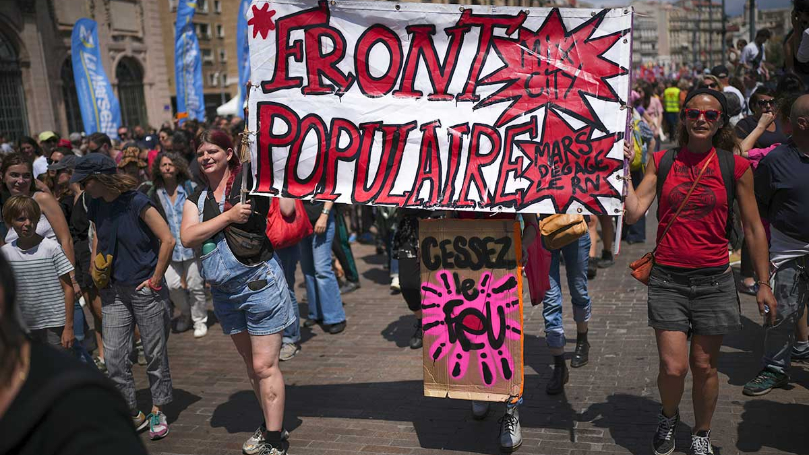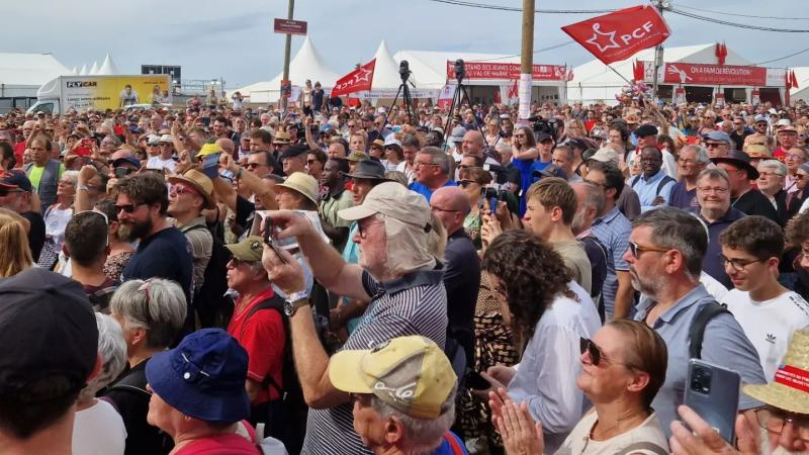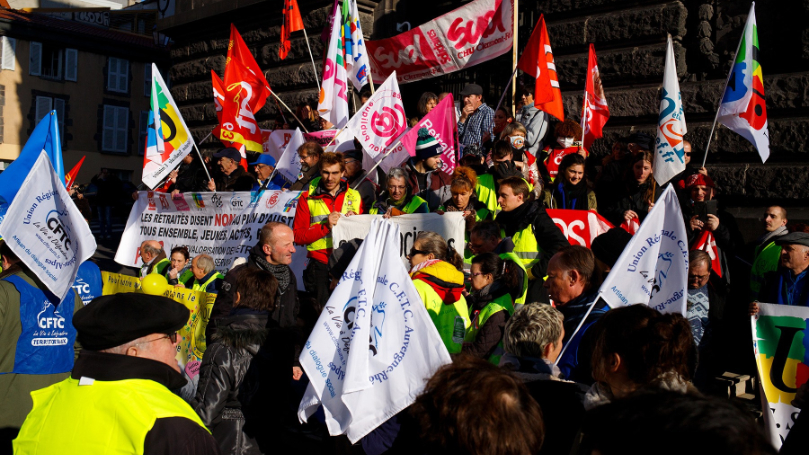
The French far-right is on the march, hoping to repeat its recent European Union election success in national polling at the end of this month. But the parties of the left and center-left have declared they won’t just sit back and let that happen.
They’ve united into a mega-alliance termed the “New Popular Front” (Nouveau Front Populaire), in a nod to the anti-fascist united front that governed the country in the 1930s. At the launch of the pact, French Communist Party leader Fabien Roussel declared, “It is time to open a new stage for the left.”
France has been plunged into a surprise snap election following the runaway win of the Rassemblement National (National Rally) party, which emerged as the biggest French force in EU parliamentary elections last week. National Rally—formerly known as the National Front—was founded in 1972 by anti-Semite and Holocaust denier Jean-Marie LePen to unite the extreme nationalist right.
Now led by his daughter, Marine Le Pen, the party has tried to paper over its neo-Nazi roots, but it maintains its strong anti-immigrant positions, and members are frequently outed as racists in the press. But like many neo-fascist parties, National Rally has also taken steps to make itself amenable to the neoliberal ideology of the capitalist ruling class. It has ditched its perennial anti-EU stance and accepted the euro currency, for instance.
Le Pen, who came in second in the last presidential election in 2022, hopes that a win now in the parliamentary vote will set her up for victory next time in 2027 and put all the levers of power into the hands of National Rally.

People’s Front 2024
The Communist Party (PCF) warned that “the noose is tightening” on democracy in France following this string of National Rally advances. To block the descent into far-right rule, it has taken a lead in initiating the New Popular Front.
The alliance brings together the PCF, France Insoumise (France Unbowed, the party of Jean-Luc Mélenchon), the center-left Socialist Party (PS), and Les Écologistes (a green environmentalist party).
Rather than competing and splitting the votes of the left, the parties of the New Popular Front will run a block of common candidates in all of France’s 577 constituencies on June 30, dividing the seats among themselves. The alliance was unveiled on June 14 in Paris.
Leaders of the four parties pledge that this is not just a short-term electoral pact, however, but rather the launch of what they hope will be an enduring coalition. Despite earlier disagreements on some foreign policy questions, a joint statement by the leaders said they were “compelled to unite by the people themselves.” Rallies of thousands have been held almost daily in France since the right’s EU election wins demanding a united progressive block.

Trade unions, mass organizations, environmental groups, and other citizen groups are now all rallying to the New Popular Front. Speaking for the Confédération Générale du Travail (CGT, France’s largest union federation) at the launch event, an autoworker from a closed Stellantis plant announced the “full support” of labor. Greenpeace followed, saying the New Popular Front’s program rose “to the challenge of transforming society.”
The alliance has put forward a 150-point program that includes major taxes on the country’s biggest fortunes, huge investments in public services and housing, the repeal of President Emmanuel Macron’s unpopular “pension reform” that raised the retirement age, price freezes to combat inflation, a rejection of EU austerity rules, an increase in the minimum wage, and much more. Recognizing the disastrous threat of climate change, it also proposes a move toward “ecological planning,” deserting the pursuit of profit at the environment’s expense.
The New Popular Front says that its first 100 days in government will be a “rupture” from all that has come before. Its program promises the “abolition of billionaire privileges” and a package of constitutional changes to eventually found a “Sixth Republic,” ending the almost dictatorial presidential system that now prevails.
The ambitious agenda recalls that of the original Popular Front of 1936. With fascists taking power across the continent and threatening to do the same in France, the Communist and Socialist Parties formed a united front in the elections of that year. It was the first victory in the world of the new “people’s front” (or popular front) strategy that the Communist International had initiated at its Seventh Congress in 1935.
Trade unions, mass organizations, environmental groups, and other citizen groups are now all rallying to the New Popular Front. Speaking for the Confédération Générale du Travail (CGT, France’s largest union federation) at the launch event, an autoworker from a closed Stellantis plant announced the “full support” of labor. Greenpeace followed, saying the New Popular Front’s program rose “to the challenge of transforming society.”
The alliance has put forward a 150-point program that includes major taxes on the country’s biggest fortunes, huge investments in public services and housing, the repeal of President Emmanuel Macron’s unpopular “pension reform” that raised the retirement age, price freezes to combat inflation, a rejection of EU austerity rules, an increase in the minimum wage, and much more. Recognizing the disastrous threat of climate change, it also proposes a move toward “ecological planning,” deserting the pursuit of profit at the environment’s expense.
The New Popular Front says that its first 100 days in government will be a “rupture” from all that has come before. Its program promises the “abolition of billionaire privileges” and a package of constitutional changes to eventually found a “Sixth Republic,” ending the almost dictatorial presidential system that now prevails.

The ambitious agenda recalls that of the original Popular Front of 1936. With fascists taking power across the continent and threatening to do the same in France, the Communist and Socialist Parties formed a united front in the elections of that year. It was the first victory in the world of the new “people’s front” (or popular front) strategy that the Communist International had initiated at its Seventh Congress in 1935.
To this day, the Popular Front era of the ’30s is a milestone in the historical memories of French workers and left-wingers, akin to the 1789 French Revolution and the Paris Commune.
Capitalists rush to the right
As for Macron, he may now be regretting his decision to call snap elections. Hoping to benefit from left disunity, Macron had planned to present himself and his center-right Renaissance party as the only alternative to Le Pen and the surging extreme right. But his own creeping moves further rightward, including passing an anti-immigration law that pandered to National Rally voters, have backfired. Renaissance’s share in the polls is rapidly sinking.
The anti-fascist vote is swinging behind the New Popular Front, which is now in second place in the polls, at 28% behind the National Rally’s 31%. The traditional conservative forces in France can read the writing on the wall and are ditching their supposed fears of the far-right and professed love of democracy.
Senior corporate executives and bankers are overcoming their prior aversion to Le Pen and National Rally because the possibility of a New Popular Front victory scares them far more. The Financial Times, the world’s foremost paper of the capitalist class, reported on Tuesday, June 18, that “France’s corporate bosses are racing to build contacts with Marine Le Pen.”
Four senior executives told FT that “the left…would be worse for business” than anything Le Pen may propose. Like many fascist and neo-fascist parties, the National Rally engages in anti-capitalist demagogy, attempting to take advantage of working-class distrust of banks, trusts, and financial magnates.
But French capitalists know it’s all talk. They are “court[ing] Marine Le Pen after taking fright at the left’s policies.” As one executive anonymously revealed to FT, “The RN’s [National Rally’s] economic policies are more of a blank slate that business thinks” it can shape however it wants.
A spokesman from National Rally indicated the truth of that prediction, disclosing that when it comes to economics, the party will hew to the neoliberal orthodoxy on spending and taxes. In response to business lobbyists, the party representative said, “We’ve told them that the RN will hold the line on deficits and present a credible plan.”
1936 all over again?
For the parties of the New Popular Front, the hope is that the 2024 vote will be a repeat of 1936 — that the people of France will unite to block the road toward fascism and more extreme capitalist class rule.
The center-right, under Macron, is running a campaign that attempts to equate the left and the neo-fascist right. It is already arguing that a victory by either would lead to France leaving the EU. Renaissance is also trying to smear the left-wing parties’ opposition to Israel’s war in Gaza as anti-Semitic while soft-pedaling the National Rally’s real racism in the hopes it can steal some of the latter’s votes.
It’s probably a failing strategy, though. The days of liberal-centrists and conservative politicians successfully appealing to fears of extreme left and extreme right while effectively governing as right-wingers themselves appear numbered.
Workers and bosses alike see the class battle shaping up in the French elections, and they’re taking sides.
Images: La République, c’est le Front Populaire by Jeanne Menjoulet (CC By 2.0 Attribution 2.0 Generic Deed); La grande fête du Nouveau Front populaire by PCF; Le fascisme, c’est le capitalisme en temps de crise by Jeanne Menjoulet (CC BY 2.0 Attribution 2.0 Generic Deed);


 Join Now
Join Now